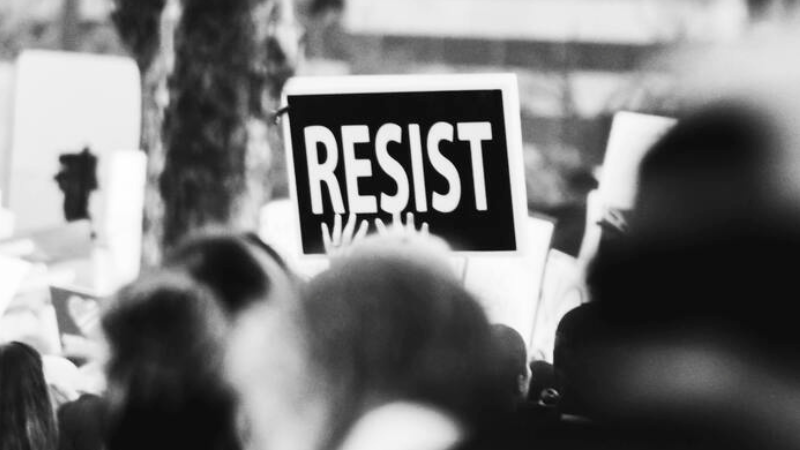Martin Luther King Jr. Day is coming up on January 20th. We take this time to reflect on MLK’s mission, his life’s work, and his unwavering dedication to Black rights in America, and meanwhile we should also use this reflection to propel us to action. This MLK day is particularly poignant as it also falls on inauguration day. It feels a bit on the nose as America ushers Donald Trump — a political leader who has consistently stood against MLK’s teachings of antiracism and non-violence — into the white house for his second term.
Here are some books that we hope will inspire you to get educated on systems of oppression while also learning how to create positive change within your sphere of influence.
ON THE CIVIL RIGHTS MOVEMENT
Learning our history is the best way to be informed of the present and understand historical patterns moving forward. To learn more about the civil rights movement, the leaders, and their impact check out these five noteworthy books:
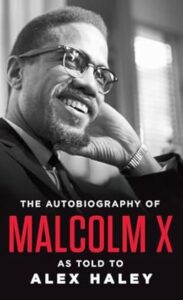 The Autobiography of Malcolm X by Malcolm X
The Autobiography of Malcolm X by Malcolm X
Through a life of passion and struggle, Malcolm X became one of the most influential figures of the 20th Century. In this riveting account, he tells of his journey from a prison cell to Mecca, describing his transition from hoodlum to Muslim minister. Here, the man who called himself “the angriest Black man in America” relates how his conversion to true Islam helped him confront his rage and recognize the brotherhood of all mankind.
An established classic of modern America, “The Autobiography of Malcolm X” was hailed by the New York Times as “Extraordinary. A brilliant, painful, important book.” Still extraordinary, still important, this electrifying story has transformed Malcom X’s life into his legacy. The strength of his words, the power of his ideas continue to resonate more than a generation after they first appeared.
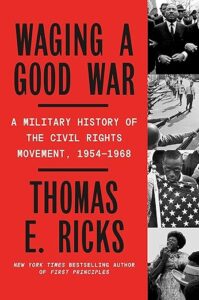 Waging a Good War: A Military History of the Civil Rights Movement, 1954-1968 by Thomas E. Ricks
Waging a Good War: A Military History of the Civil Rights Movement, 1954-1968 by Thomas E. Ricks
In Waging a Good War, the bestselling author Thomas E. Ricks offers a fresh perspective on America’s greatest moral revolution–the civil rights movement of the 1950s and 1960s–and its legacy today. While the Movement has become synonymous with Martin Luther King, Jr.’s ethos of nonviolence, Ricks, a Pulitzer Prize-winning war reporter, draws on his deep knowledge of tactics and strategy to advance a surprising but revelatory idea: the greatest victories for Black Americans of the past century were won not by idealism alone, but by paying attention to recruiting, training, discipline, and organization–the hallmarks of any successful military campaign.
An engaging storyteller, Ricks deftly narrates the Movement’s triumphs and defeats. He follows King and other key figures from Montgomery to Memphis, demonstrating that Gandhian nonviolence was a philosophy of active, not passive, resistance. While bringing legends such as Fannie Lou Hamer and John Lewis into new focus, Ricks also highlights lesser-known figures who played critical roles in fashioning nonviolence into an effective tool. This includes activists James Lawson, James Bevel, Diane Nash, and Septima Clark foremost among them.
He also offers a new understanding of the Movement’s later difficulties as internal disputes and white backlash intensified. Waging a Good War is an indispensable addition to the literature of racial justice and social change. It’s one that offers vital lessons for our own time.
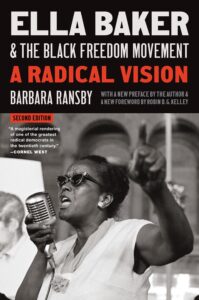 Ella Baker and the Black Freedom Movement: A Radical Democratic Vision by Barbara Ransby
Ella Baker and the Black Freedom Movement: A Radical Democratic Vision by Barbara Ransby
She was one of the most important African American leaders of the 20th century. And perhaps the most influential woman in the civil rights movement. Ella Baker (1903-1986) was an activist whose remarkable career spanned fifty years and touched thousands of lives. A gifted grassroots organizer, Baker shunned the spotlight in favor of vital behind-the-scenes work that helped power the Black freedom struggle. Making her way in predominantly male circles while maintaining relationships with a vibrant group of women, students, and activists, Baker was a national officer and key figure in the NAACP, a founder of the Southern Christian Leadership Conference, and a prime mover in the creation of the Student Nonviolent Coordinating Committee.
In this definitive biography, Barbara Ransby chronicles Baker’s long and rich career. She reveals her complexity, radical democratic worldview, and enduring influence on group-centered, grassroots activism. Ransby paints a vivid picture of the African-American fight for justice and its intersections with other progressive struggles worldwide throughout the twentieth century.
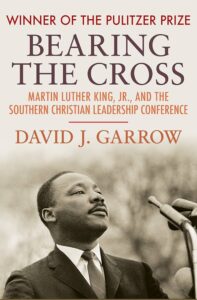 Bearing the Cross: Martin Luther King, Jr., and the Southern Christian Leadership Conference by David Garrow
Bearing the Cross: Martin Luther King, Jr., and the Southern Christian Leadership Conference by David Garrow
Winner of the 1987 Pulitzer Prize for Biography and the Robert F. Kennedy Book Award, this is the most comprehensive book ever written about Dr. Martin Luther King, Jr. Based on more than seven hundred interviews, access to King’s personal papers, and thousands of FBI documents, Bearing the Cross traces King’s metamorphosis from a young, earnest pastor into the foremost spokesperson of the black freedom struggle. At the book’s heart is King’s growing awareness of the symbolic meaning of the cross as he gradually accepts a life that will demand the ultimate in self-sacrifice. This is a towering portrait of a man at the epicenter of one of the most dramatic periods in our history.
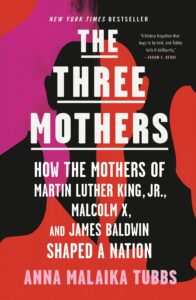 The Three Mothers: How the Mothers of Martin Luther King, Jr., Malcolm X, and James Baldwin Shaped a Nation by Anna Malaika Tubbs
The Three Mothers: How the Mothers of Martin Luther King, Jr., Malcolm X, and James Baldwin Shaped a Nation by Anna Malaika Tubbs
Berdis Baldwin, Alberta King, and Louise Little were all born at the beginning of the 20th century and forced to contend with the prejudices of Jim Crow as Black women. These three extraordinary women passed their knowledge to their children with the hope of helping them to survive in a society that would deny their humanity from the very beginning–from Louise teaching her children about their activist roots, to Berdis encouraging James to express himself through writing, to Alberta basing all of her lessons in faith and social justice. These women used their strength and motherhood to push their children toward greatness, all with a conviction that every human being deserves dignity and respect despite the rampant discrimination they faced.
These three mothers taught resistance and a fundamental belief in the worth of Black people to their sons, even when these beliefs flew in the face of America’s racist practices and led to ramifications for all three families’ safety. The fight for equal justice and dignity came above all else for the three mothers.
These women, their similarities and differences, as individuals and as mothers, represent a piece of history left untold and a celebration of Black motherhood long overdue.
ON SYSTEMS OF OPPRESSION
Learning the insidious ways in which racism, the patriarchy, and other systems of oppression impact our daily lives is essential to deconstructing their influence. Take a deep dive into how oppression is woven into the fabric of our country and check out these books:
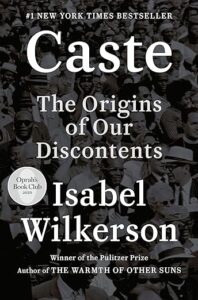 Caste: The Origins of Our Discontents by Isabel Wilkerson
Caste: The Origins of Our Discontents by Isabel Wilkerson
Beyond race, class, or other factors, there is a powerful caste system that influences people’s lives and behavior and the nation’s fate. Linking the caste systems of America, India, and Nazi Germany, Isabel Wilkerson explores eight pillars that underlie caste systems across civilizations, including divine will, bloodlines, stigma, and more. She shows the ways that the insidious undertow of caste is experienced every day using riveting stories about people, including Martin Luther King, Jr., baseball’s Satchel Paige, a single father and his toddler son, and Wilkerson herself. Finally, she points forward to ways America can move beyond the artificial and destructive separations of human divisions, toward hope in our common humanity.
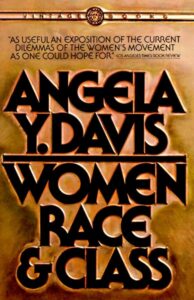 Women, Race, & Class by Angela Y. Davis
Women, Race, & Class by Angela Y. Davis
Angela Davis provides a powerful history of the social and political influence of whiteness and elitism in feminism, from abolitionist days to the present, and demonstrates how the racist and classist biases of its leaders inevitably hampered any collective ambitions. While Black women were aided by some activists like Sarah and Angelina Grimke and the suffrage cause found unwavering support in Frederick Douglass, many women played on the fears of white supremacists for political gain rather than take an intersectional approach to liberation. Here, Davis not only contextualizes the legacy and pitfalls of civil and women’s rights activists, but also discusses Communist women, the murder of Emmitt Till, and Margaret Sanger’s racism. Davis shows readers how the inequalities between Black and white women influence the contemporary issues of rape, reproductive freedom, housework and child care in this bold and indispensable work.
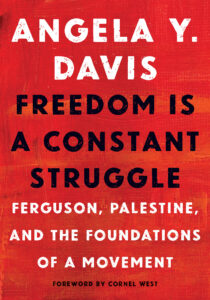 Freedom Is a Constant Struggle: Ferguson, Palestine, and the Foundations of a Movement by Angela Y. Davis
Freedom Is a Constant Struggle: Ferguson, Palestine, and the Foundations of a Movement by Angela Y. Davis
In these newly collected essays, interviews, and speeches, world-renowned activist and scholar Angela Y. Davis illuminates the connections between struggles against state violence and oppression throughout history and around the world.
Reflecting on the importance of black feminism, intersectionality, and prison abolitionism for today’s struggles, Davis discusses the legacies of previous liberation struggles, from the Black Freedom Movement to the South African anti-Apartheid movement. She highlights connections and analyzes today’s struggles against state terror, from Ferguson to Palestine.
Facing a world of outrageous injustice, Davis challenges us to imagine and build the movement for human liberation. And in doing so, she reminds us that “Freedom is a constant struggle.”
Angela Y. Davis is a political activist, scholar, author, and speaker. She is an outspoken advocate for the oppressed and exploited, writing on Black liberation, prison abolition, the intersections of race, gender, and class, and international solidarity with Palestine; the author of several books, including Women, Race, and Class and Are Prisons Obsolete?; the subject of the acclaimed documentary Free Angela and All Political Prisoners; and is Distinguished Professor Emerita at the University of California, Santa Cruz.
One of America’s most provocative public intellectuals, Dr. Cornel West has been a champion for racial justice since childhood. His writing, speaking, and teaching weave together the traditions of the black Baptist Church, progressive politics, and jazz. The New York Times has praised his “ferocious moral vision.” His many books include Race Matters, Democracy Matters, and his autobiography, Brother West: Living and Loving Out Loud.
Frank Barat is a human rights activist and author. He was the coordinator of the Russell Tribunal on Palestine and is now the president of the Palestine Legal Action Network. His books include Gaza in Crisis and Corporate Complicity in Israel’s Occupation.
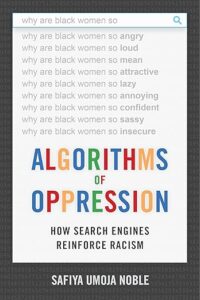 Algorithms of Oppression: How Search Engines Reinforce Racism by Safiya Umoja Noble
Algorithms of Oppression: How Search Engines Reinforce Racism by Safiya Umoja Noble
Run a Google search for “Black girls”–what will you find? “Big Booty” and other sexually explicit terms are likely to come up as top search terms. But, if you type in “white girls,” the results are radically different. Unmoderated discussions and suggested sites portraying Black women as “sassy” or “angry” disturbingly misrepresent Black womanhood today.
In Algorithms of Oppression, Safiya Umoja Noble challenges the idea that search engines like Google offer an equal playing field for all forms of ideas, identities, and activities. Data discrimination is a real social problem; Noble argues that the combination of private interests in promoting certain sites, along with the monopoly status of a relatively small number of Internet search engines, leads to a biased set of search algorithms that privilege whiteness and discriminate against people of color, specifically women of color.
Noble reveals racism and sexism in online discoverability through analysis of searches and paid advertising research. As search engines and their related companies grow in importance–operating as a source for email, a major vehicle for primary and secondary school learning, and beyond–understanding and reversing these disquieting trends and discriminatory practices is of utmost importance.
An original, surprising and, at times, disturbing account of bias on the internet, Algorithms of Oppression contributes to our understanding of how racism is created, maintained, and disseminated in the 21st century.
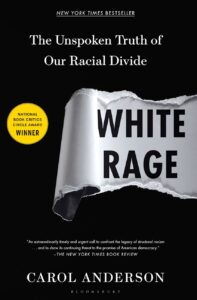 White Rage: The Unspoken Truth of Our Racial Divide by Carol Anderson
White Rage: The Unspoken Truth of Our Racial Divide by Carol Anderson
As Ferguson, Missouri, erupted in August 2014, and media commentators across the ideological spectrum referred to the angry response of African Americans as “black rage,” historian Carol Anderson wrote a remarkable op-ed in The Washington Post suggesting that this was, instead, “white rage at work. With so much attention on the flames,” she argued, “everyone had ignored the kindling.”
Since 1865 and the passage of the Thirteenth Amendment, every time African Americans have made advances towards full participation in our democracy, white reaction has fueled a deliberate and relentless rollback of their gains.
The end of the Civil War and Reconstruction was greeted with the Black Codes and Jim Crow; the Supreme Court’s landmark 1954 Brown v. Board of Education decision was met with the shutting down of public schools throughout the South while taxpayer dollars financed segregated white private schools; the Civil Rights Act of 1964 and Voting Rights Act of 1965 triggered a coded but powerful response, the so-called Southern Strategy and the War on Drugs that disenfranchised millions of African Americans while propelling presidents Nixon and Reagan into the White House, and then the election of America’s first black President, led to the expression of white rage that has been as relentless as it has been brutal.
Carefully linking these and other historical flashpoints when social progress for African Americans was countered by deliberate and cleverly crafted opposition, Anderson pulls back the veil that has long covered actions made in the name of protecting democracy, fiscal responsibility, or protection against fraud, rendering visible the long lineage of white rage. Compelling and dramatic in the unimpeachable history it relates, White Rage will add an important new dimension to the national conversation about race in America.
FOR WHITE WOMEN
White women hold a precarious position in society — we can be the oppressor or the oppressed depending on how we leverage our identity and privilege. For an intersection look at how white women can negotiate our privilege to benefit marginalized folks read these compelling books:
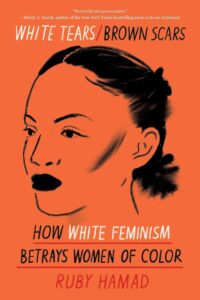 White Tears/Brown Scars: How White Feminism Betrays Women of Color by Ruby Hamad
White Tears/Brown Scars: How White Feminism Betrays Women of Color by Ruby Hamad
Taking us from the slave era, when white women fought in court to keep “ownership” of their slaves, through the centuries of colonialism, when they offered a soft face for brutal tactics, to the modern workplace, White Tears/Brown Scars tells a charged story of white women’s active participation in campaigns of oppression. It offers a long overdue validation of the experiences of women of color.
Discussing subjects as varied as The Hunger Games, Alexandria Ocasio-Cortez, the viral BBQ Becky video, and 19th-century lynchings of Mexicans in the American Southwest, Ruby Hamad undertakes a new investigation of gender and race. She demonstrates how society created the division between innocent white women and racialized, sexualized women of color, and explains why confronting this division is crucial.
Along the way, there are revelatory responses to questions like: Why are white men not troubled by sexual assault on women? (See Christine Blasey Ford.) Hamad rigorously and precisely builds a powerful argument about the legacy of white superiority that socializes us.
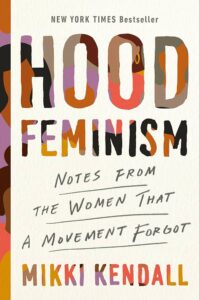 Hood Feminism: Notes from the Women That a Movement Forgot by Mikki Kendall
Hood Feminism: Notes from the Women That a Movement Forgot by Mikki Kendall
Today’s feminist movement has a glaring blind spot, and paradoxically, it is women. Mainstream feminists rarely talk about meeting basic needs as a feminist issue, argues Mikki Kendall, but food insecurity, access to quality education, safe neighborhoods, a living wage, and medical care are all feminist issues. All too often, however, the focus is not on basic survival for the many, but on increasing privilege for the few. That feminists refuse to prioritize these issues has only exacerbated the age-old problem of both internecine discord and women who rebuff at carrying the title. Moreover, prominent white feminists broadly suffer from their own myopia with regard to how things like race, class, sexual orientation, and ability intersect with gender. How can we stand in solidarity as a movement, Kendall asks, when there is the distinct likelihood that some women are oppressing others?
In her essays, Mikki Kendall argues modern feminism consistently fails to address most women’s needs. Drawing on personal experiences and sharp commentary, Hood Feminism critiques a movement in flux. Kendall’s debut is a fierce call for feminists to live feminism’s true mandate in thought and action.
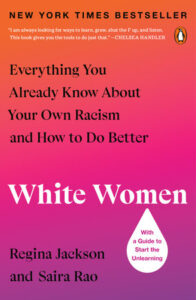 White Women: Everything You Already Know about Your Own Racism and How to Do Better by Regina Jackson & Saira Rao
White Women: Everything You Already Know about Your Own Racism and How to Do Better by Regina Jackson & Saira Rao
A no-holds-barred guide for white women to stop being nice and dismantle white supremacy, from Race2Dinner and Deconstructing Karen.
It’s no secret society conditions white women to be “nice.” Did you know perfectionism and avoiding conflict are traits of white supremacy culture?
The Race2Dinner founders note white women often hide behind niceness and perfection, hindering anti-racism efforts.
Jackson and Rao pose urgent questions: How has being “nice” helped Black women, Indigenous women and other women of color? How has being “nice” helped you in your quest to end sexism? Has being “nice” earned you economic parity with white men? They free white women from niceness by analyzing nine behaviors–like tone-policing and weaponizing tears–that uphold white supremacy.
White Women is a call to action to those looking to take the next steps in dismantling white supremacy. Your white supremacy. Real anti-racism work often means facing resistance from white people wanting to limit your involvement. If you are not ticking white people off on a regular basis, you are not doing it right.
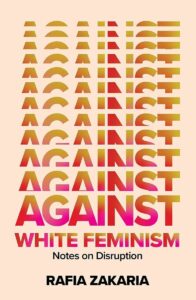 Against White Feminism: Notes on Disruption by Rafia Zakaria
Against White Feminism: Notes on Disruption by Rafia Zakaria
“Experts”on feminism have heralded upper-middle-class white women. They have presided over multinational feminist organizations and written much of what we consider the feminist canon, espousing sexual liberation and satisfaction, LGBTQ inclusion, and racial solidarity, all while branding the language of the movement itself in whiteness and speaking over Black and Brown women in an effort to uphold privilege and perceived cultural superiority. An American Muslim woman, attorney, and political philosopher, Rafia Zakaria champions a reconstruction of feminism in Against White Feminism, centering women of color in this transformative overview and counter-manifesto to white feminism’s global, long-standing affinity with colonial, patriarchal, and white supremacist ideals.
Zakaria critiques Western feminist imperialism, white saviorism, and narrow views of empowerment, following intersectional feminist leaders. She challenges white feminist empowerment, centering Black and Brown feminist thought in this radical critique.
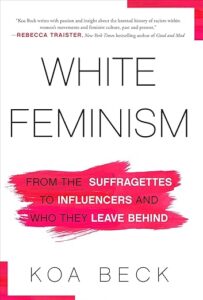 White Feminism: From the Suffragettes to Influencers and Who They Leave Behind by Koa Beck
White Feminism: From the Suffragettes to Influencers and Who They Leave Behind by Koa Beck
Written with passion and insight, this timely call for change explores racism in women’s movements and feminist culture.
Koa Beck boldly examines feminism’s history–from suffragists to corporate feminism–addressing race, empowerment, and inclusion today. She also examines overlooked communities–including Native American, Muslim, transgender, and more–and their ongoing struggles for social change. Beck’s “intellectually smart, emotionally intelligent” writing reveals how elitism and racism shape feminist discourse.
Using pop culture and history, she reveals how women were excluded from the movement and how to change that. Combining scholarship, data, and sharp commentary, White Feminism offers a blueprint for a more inclusive feminism.
FOR THE KIDS
Are you a parent looking to start your kiddo early on fighting for equity and equality? Check out these fantastic kid’s books aimed to help young people understand racism and how to advocate for change:
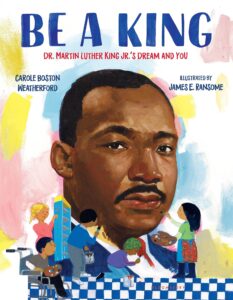 Be a King: Dr. Martin Luther King Jr.’s Dream and You by Carole Boston Weatherford, illustrated by James E. Ransome
Be a King: Dr. Martin Luther King Jr.’s Dream and You by Carole Boston Weatherford, illustrated by James E. Ransome
You can be a King. Stamp out hatred. Put your foot down and walk tall.
You can be a King. Beat the drum for justice. March to your own conscience.
This dual narrative of Dr. King’s life and a modern class highlights timeless principles readers can emulate today. Dr. King’s example inspires a new generation to lead and change the world…to be a King.
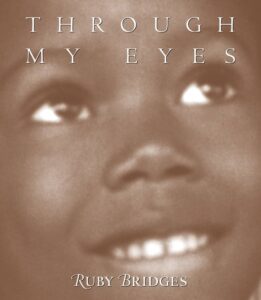 Through My Eyes by Ruby Bridges
Through My Eyes by Ruby Bridges
In November 1960, a six-year-old Black girl, protected by marshals, braved a mob to enter her school. Civil rights icon Ruby Bridges shares each dramatic step of this pivotal event in her own words.
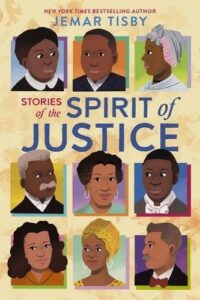 Stories of the Spirit of Justice by Jemar Tisby
Stories of the Spirit of Justice by Jemar Tisby
We are living in the civil rights movement of our day. But the challenges of the present call us to remember the past. Throughout history, faith-driven leaders like MLK Jr., Rosa Parks, and Harriet Tubman resisted oppression and pursued justice for all.
This is the companion book for young readers ages 8-12 to Jemar Tisby’s The Spirit of Justice. It tells the story of the justice movement through short biographies of the figures who did the work. The book includes illustrations depicting the people profiled and practical tips connecting readers to the continued fight for justice. And it is essential reading for everyone who still dreams of a land where all are truly free.
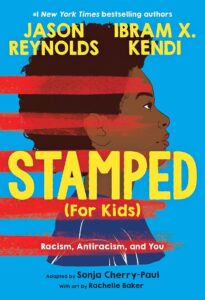 Stamped (for Kids): Racism, Antiracism, and You by Jason Reynolds & Ibram X. Kendi, adapted by Sonja Cherry-Paul, illustrated by Rachelle Baker
Stamped (for Kids): Racism, Antiracism, and You by Jason Reynolds & Ibram X. Kendi, adapted by Sonja Cherry-Paul, illustrated by Rachelle Baker
This chapter book edition of the #1 New York Times bestseller by luminaries Ibram X. Kendi and Jason Reynolds is an essential introduction to the history of racism and antiracism in America
RACE. Uh-oh. The R-word.
But actually talking about race is one of the most important things to learn how to do.
Adapted from Stamped, this book takes readers on a journey through past and present racism and antiracism. Kids will learn the origins of racist ideas, their impact today, and meet people who fought racism with antiracism. Along the way, they’ll learn how to identify and stamp out racist thoughts in their own lives.
Ibram X. Kendi’s research, Jason Reynolds’s and Sonja Cherry-Paul’s writing, and Rachelle Baker’s art come together in this vital read.
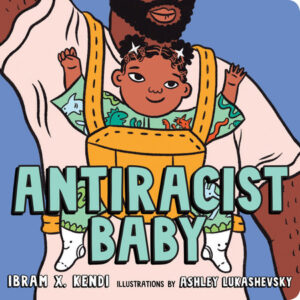 Antiracist Baby by Ibram X. Kendi, illustrated by Ashley Lukashevsky
Antiracist Baby by Ibram X. Kendi, illustrated by Ashley Lukashevsky
Take your first steps with Antiracist Baby! Likewise, follow Antiracist Baby’s nine easy steps for building a more equitable world.
Antiracist Baby introduces the youngest readers and the grown-ups in their lives to the concept and power of antiracism. The book provides the language necessary to begin critical conversations at the earliest age. Antiracist Baby makes the perfect gift for readers of all ages dedicated to forming a just society.
Featured on Netflix’s Bookmarks: Celebrating Black Voices, Good Morning America, NPR, CBS, and more.

A literary omnivore and influential Bookstagrammer, Layne applies her vivid creativity for every title we promote by deftly coordinating news coverage and events for authors, writing and editing diverse content for social media, and assisting with Books Forward’s social media engagement initiatives.
As a former special education teacher, Layne firmly believes in the importance of literature and accessibility. This unique point of view is an asset in her publicity efforts as she works to reach readers across various platforms and demographics.
Layne received her Bachelors of Arts in Creative Writing and Bachelors of Science in Psychology from Virginia Polytechnic Institute and State University, and her Masters of Art in Teaching from Relay Graduate School of Education. She lives in New Orleans with her loyal, but sadly illiterate cat, Macaroni.
